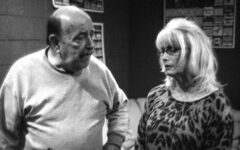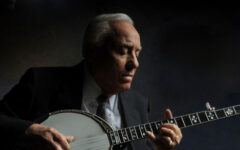
The night Tony Rice first made grown men cry was in September 2013. In a speech marking his induction into the Bluegrass Music Hall of Fame, Rice labored through his early remarks in the raspy, broken voice we had become used to over the previous 19 years.
Then he paused, asked for God’s help, and talked in a clear, normal voice. You could hear the gasps. I wasn’t the only person in tears that night. In fact, I chose these words for the headline on my Bluegrass Today awards show wrapup: The Night Grown Men Cried.
Saturday night, as word of his death spread through the bluegrass world and beyond, grown men cried for Tony Rice again.
Thousands and thousands of words will be written about him in the next week or so. I’d like to ask that you ignore a couple of them: “perhaps” and “arguably,” as in perhaps or arguably the best, most influential bluegrass guitar player ever. Those words are simply wasted space. Tony Rice WAS the most influential guitar player bluegrass and acoustic music has ever heard, doing for the guitar what Earl Scruggs did for the banjo. The best. Period. End of argument.
But don’t take my word for it.
Listen to Jim VanCleve: “The man is on the Mount Rushmore of bluegrass and acoustic guitar, and his influence is impossible to overstate.”
Or Paul Schiminger, executive director of the International Bluegrass Music Association: “His musical impact was of ‘Mount Rushmore’ proportions.”
Get the picture? Those of us fortunate enough to hear Rice sing and play, will talk about crossing his path for as long as we are able to express those memories. Those who didn’t get to hear him sing could take comfort in hearing him pick. And when he couldn’t sing or pick – even superheroes lose the race against time – we kept up hope that he would resume playing soon.
Rice, himself, gave us hope that night seven years ago in Raleigh. As he talked in a voice that was clear and strong, it seemed possible, even likely, that he would soon be able to sing again after a 19-year break. Alas, it was not to be.
And after a long stretch of not playing, when it seemed like we were destined not to hear his guitar again, we’d hear little suggestions that maybe, just maybe, he was coming back. Even after his friend and biographer, Tim Stafford, said onstage at Gettysburg a while back that Tony would probably never play again, there was a glimmer of hope.
That’s another astonishing fact about Tony Rice. He had the grace and knowledge to know when to let go. It’s hard to do, and many folks in the public eye stay too long. It’s hard to watch. But not Tony. He sang and played with such seemingly little effort, and truth be told when his hands and voice betrayed him, he could easily have wowed audiences with 40 percent of his skills. But Tony knew better. Fortunately, he leaves us with recordings and memories that will live on.
Here are some of those memories, shared by his colleagues and acolytes:
Kenny Smith: “When I first moved to Tennessee in 1987, the first show I saw at the Station Inn was the Tony Rice Unit. I got there early and sat right up front. Within five minutes of the kick off, Mr. Rice schooled me on rhythm, tone, economy of motion, dynamics, improvisation, tuning, chord substitution, etc. The list goes on and on. I remember walking away that night so inspired to learn the guitar in a deeper way. I pretty much started over….Thank you Tony Rice for the music, memories and inspiration that will last a lifetime.”
Darin Aldridge: “My heart is heavy today to know that the world has lost one of music’s greatest treasures. There’s so much I’d like to say but my words can’t seem to be found. Tony, your music will live on for generations to come, and your music will always speak volumes.”
Sierra Hull: “His music moved beyond the stretches of imagination – so original, beautiful, strong, fearless, and free. His singing, playing, song choices and arrangements captivated me from the first note I ever heard of Church Street Blues as an 8-year-old girl. He made me want to be an artist.”
Sierra was just 12 when she met Tony for the first time, after Alison Krauss invited both of them to play with her at the Grand Ole Opry. “As I arrived to the artist entrance, they told my family that we would be sharing a dressing room with Tony. I was both excited and nervous to get to meet him. The first thing he did when I entered the room was hand me that legendary D28 guitar. I couldn’t believe it. Who does that? I was just a kid! But he did.”
Accolades came in from the country music world as well.
Kenny Chesney: “When I was in college I played a lot of music with a couple friends of mine Shawn Lane and Marcus Smith. Every Wednesday night we played a place called the Down Home in Johnson City, TN. Whether it was Green Light On The Southern, which was the first song we ever played, Four Strong Winds, or anything off the Skaggs/ Rice album… his music was always a staple of our set. Tony Rice inspired so many, including a kid like me from East Tennessee who was in awe of the way he sang and played Me And My Guitar. I’ll never forget seeing him sing that at the IBMA bluegrass festival in Owensboro, KY. It’s printed in my brain forever! Rest In Peace Tony Rice.”
LeeAnn Womack: “Tony Rice… One of my very favorites. I’ve gotten so much enjoyment over the years from listening to his records, bootleg cassette tapes, and finding gems on YouTube (look for the MerleFest stuff). Thank you Jill Douglas for introducing me. Thank you, Tony, for the music.”
Alison Krauss: “We all mourn the loss of our one and only Tony Rice. We’re so grateful for what he gave us and left with us. The highest peak.
RIP.”
Still no word on funeral arrangements. We understand from the family that North Carolina requires an autopsy whenever someone dies alone, to determine the cause of death. Date and time for burial will be set afterwards.







